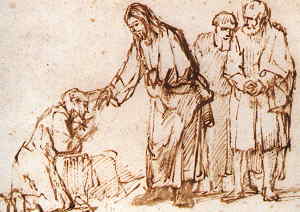
Readings: 1 Cor 6,1-11; Ps 149, 1-6.9; Lk 6,12-19
This morning we continue reading through St. Paul’s first letter to the Corinthians and St. Luke’s Gospel. The theme for today’s readings is the nature and structure of the Church. In this morning’s Gospel we read of Jesus’ calling the twelve after spending the night in prayer on the mountain. It is significant that St. Peter comes first on the list, as he does in all the Gospels whenever the apostles are listed. Of course, this is indicative of the unique primacy given to Peter among the apostles and in the Church. The number twelve itself is significant because in the new Israel, which is the Church, the apostles correspond to the twelve patriarchs, the sons of Jacob, who was given the name Israel by the angel after wrestling with Jacob all night long. It is from the sons of Israel that the twelve tribes of Israel claim descent. All of this is enough to indicate Jesus, in his calling of the twelve, is establishing a new people.
After Jesus’ resurrection, it was the twelve who, at his command, took the Gospel "into all the world" (Mk 16,15/Matt 28,19-20). We see from Paul’s missionary activity that as the Church was established in various places, like Corinth, a structure was necessary, beginning with the apostles, who consecrated bishops, who, in turn, ordained priests and deacons. While in the primitive Church there was some variation in how the earliest communities were organized, establishing a structure was done in other ancient Churches, not established by Paul, who claim apostles as founders: the Church in southwestern India, founded by St. Thomas; the Churches of Egypt and Venice, founded by St. Mark; the Churches of Rome and Antioch, founded by Peter; the Church in Jerusalem, presided over by St. James, etc. After establishing his new people on the basis of the twelve apostles, at least in St. Luke’s chronology, our Lord then teaches his people the law they are live by, known in Luke as the Sermon on the Plain. This is Luke’s version of Matthew’s magisterial Sermon on the Mount. It is with this so-called sermon that our Gospel today end. Again, the parallel between Israel and the Church is made clear. Just as Israel was formed as a people and given the law, so, too, with the new People of God.
Picking up on this theme is St. Paul writing to the Corinthians. In the Church of Corinth we have a microcosm of the entire Church, even the Church in our own day to some extent. Paul exhorts his Christian brothers and sisters not to cause scandal to believer and unbeliever alike by taking their disputes and squabbles to civil courts. Ideally, according to Paul, if everyone is endeavoring to be the spiritual person he has been urging them to be, such disputes would be extremely rare, or even non-existent. In fact, he tells them, "it is in any case, a failure on your part that you have lawsuits against one another" (1 Cor 6,7). Stated simply, strife in the Church and among believers should be avoided, even to the point of suffering an injustice. As he wrote earlier in the letter, which we read last week, when urging the Corinthians to be "fools for Christ," in imitation of him and Apollos, when they were ridiculed, they should bless and when they were persecuted, to patiently endure (1 Cor 4,12).
Above all, Paul is concerned that strife in the Christian community that spills into civil courts is an obstacle to unbelievers. The apostle goes beyond how we should settle disputes that arise within the Christian community to all manner of behavior that is contrary to what Christ taught. He writes about those things that if done and not repented of and forsaken will bring damnation: fornication, adultery, and all manner of sexual immorality, drunkenness, theft, greed, and lying (1 Cor 6,9-10). After all, if we do not practice what we preach, and if we do not preach what the Lord Jesus taught, then we are indeed hypocrites, hollow people who heap damnation on ourselves.
How many of us know people who either do not believe, or who do not practice their faith because of the bad example set by believers of bad experiences they have had with professed Christians, with people like you and I who attend Church regularly and publicly identify ourselves as Catholics? Currently our Church suffers from a serious lack of credibility in our culture and society, which needs Christ so badly, because of the scandals of recent years, in which even many bishops are complicit, with some of the guilty parties refusing to acknowledge responsibility or to publicly repent of their sins of commission and omission.
In his characteristic fashion, St. Paul, at the end of this passage, reminds them and us that, prior to our following Christ, we used to do many of the things he justly condemns. More importantly he reminds us that there is forgiveness of the sins; "you have had yourselves washed, you were sanctified, you were justified in the name of the Lord Jesus Christ and in the Spirit of our God" (1 Cor 6,11). My brothers and sisters, there is forgiveness and cleansing in Christ. We should avail ourselves of it often, confessing our sins freely so that "we walk in the light" and "have fellowship with one another" (1 Jn 1,7). So let us, like the people in today’s Gospel, avail ourselves of the power that comes forth from our Lord Jesus Christ, which is the power to heal our broken and ailing souls in order to be the people he has divinely constituted us to be (Lk 6,19). To be a people in whom “the Lord takes delight” (Ps 149,4).


No comments:
Post a Comment